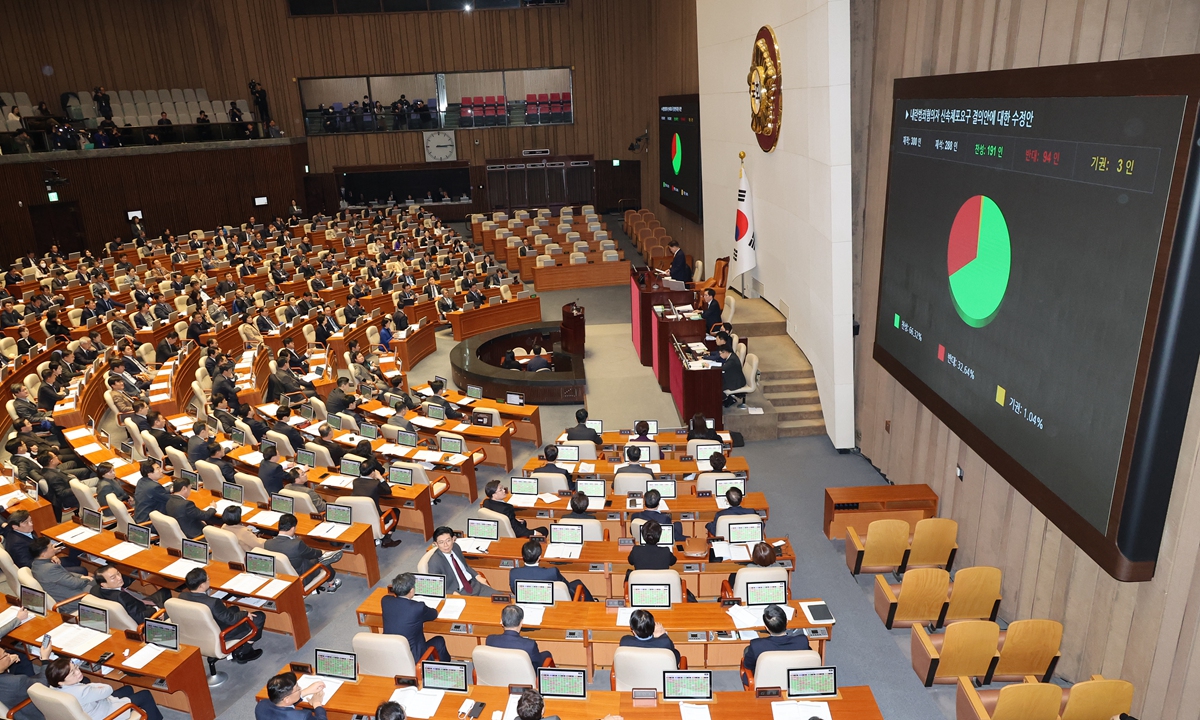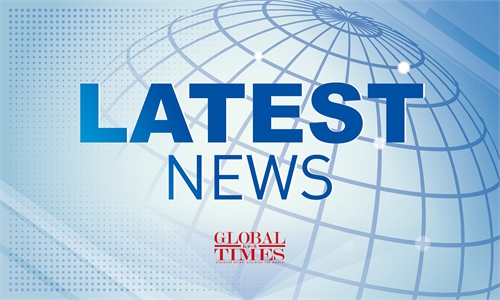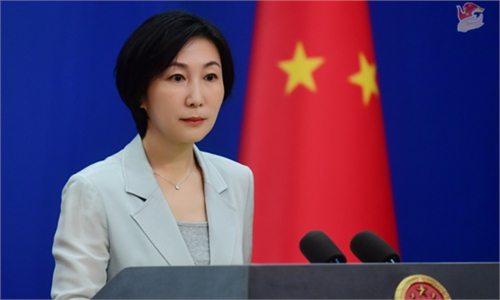Yoon's comment 'deeply upsetting'; reference to China in address may be to divert attention: expert

South Korea's National Assembly on December 10, 2024 passes a bill to appoint a permanent special counsel to investigate insurrection charges against President Yoon Suk-yeol, as well as a resolution calling for Yoon's immediate arrest over his botched martial law declaration. Photo: VCG
China will not comment on the ROK's domestic affairs, but China absolutely opposes the ROK side associating its domestic affairs with Chinese elements, amplifying unfounded "Chinese spy" accusations and throwing mud at normal economic and trade cooperation. None of these are conducive to a healthy and steady China-ROK relationship, Chinese Foreign Ministry spokesperson Mao Ning said on Thursday.
Mao made the remarks in response to a question about South Korean President Yoon Suk-yeol's remarks in a televised address on Thursday, in which he said "the major opposition party is now threatening national security and public safety" and mentioned cases involving Chinese nationals in South Korea. He also claimed that "Chinese solar power facilities will destroy forests nationwide," according to an unofficial translation of President Yoon's address released by Business Korea.
Yoon said that they "tried to amend the espionage provisions of the Criminal Act, but the major opposition party stubbornly blocked… Which country's party and parliament are they?" according to Business Korea.
"We are surprised by those comments and find them deeply upsetting," Mao said that the Chinese government always asks Chinese nationals overseas to observe local laws and regulations. "We noted that the conclusion is yet to be made on the particular case mentioned by the ROK side," said Mao.
China once again urges the ROK to handle justly cases concerning Chinese nationals, keep the Chinese side informed of the handling of the cases, and ensure the safety and lawful rights and interests of Chinese nationals concerned, the spokesperson added.
Yoon brought up China while criticizing the opposition, but his remarks on China are logically unfounded. For example, accusing Chinese-made solar panels of damaging forests across South Korea seems absurd. It is unclear why he was so aggressively critical of China, Dong Xiangrong, senior research fellow at the National Institute of International Strategy at the Chinese Academy of Social Sciences, told the Global Times on Thursday.
As Yoon's political future is now beyond his control, we need to closely observe the political situation in South Korea, said Dong.
Facing mounting pressure of impeachment, Yoon's speech, his repeated references to China and the alleged threats to South Korea's national security may be a strategy to rally right-wing support by all means and create justifications for declaring martial law. This seems to be a tactic aimed at diverting public attention from the impeachment, Zheng Jiyong, director of the Center for Korean Studies at Fudan University in Shanghai, told the Global Times.
In the televised public address, Yoon said sending troops to the National Assembly during martial law cannot amount to insurrection, while defying calls to step down. Yoon said he used his presidential power to declare martial law "to protect the nation and normalize state affairs" against the opposition that paralyzed the government, calling it a "highly calibrated political judgment," according to South Korea's Yonhap News Agency.
The main opposition Democratic Party has previously blasted President Yoon for claiming he declared martial law to protect the Constitution, calling the president's words an "expression of extreme delusion" and a "confession" to the crime of imposing martial law illegally, according to KBS.
The opposition-controlled National Assembly on Thursday passed another bill that seeks a special counsel probe into President Yoon Suk-yeol over his botched imposition of martial law and a bill proposing a special probe of the first lady, Yonhap reported.
Commenting on Yoon's speech, Xiang Haoyu, a research fellow at the China Institute of International Studies, told the Global Times on Thursday that as the momentum for impeachment builds, Yoon may be trying to drag the process using his position as president, however, more ruling party members appear likely to change sides.
South Korean lawmakers are scheduled to vote at 5 pm local time this Saturday on the main opposition Democratic Party of Korea's motion to impeach Yoon. Yoon escaped impeachment last Saturday due to a lack of quorum as most lawmakers from his ruling People Power Party boycotted the vote, the Xinhua News Agency cited local media as reported.
Currently, multiple investigative bodies, including the police and prosecutor, are pressing forward with investigations against the martial law.
Xiang said that South Korean politics is currently characterized by deep divisions and escalating tensions between progressive and conservative factions.
This growing polarization reflects broader political turmoil. No matter what fate Yoon faces, the turbulence is unlikely to subside in short time and may persist for some time, said the expert.



